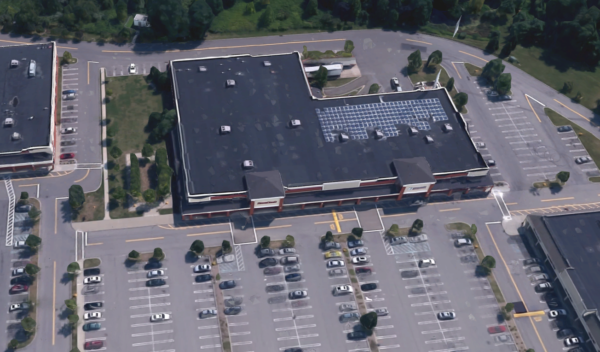Urstadt Biddle Properties, owner of about 78 properties encompassing more than 5.1 million square feet of gross leasable area, is proposing to make a significant change to its Somers Commons shopping center at 80 U.S. Route 6 in Somers.
One of the shopping center’s anchors, HomeGoods, is moving to the Cortlandt Town Center in Mohegan Lake. Urstadt Biddle proposes to demolish the existing commercial building housing HomeGoods and replace it with multifamily housing.

Urstadt Biddle, which is headquartered in Greenwich, has presented its concept to the town of Somers’ Planning Board. The proposed residential building would have 160 units in five stories along with dedicated parking for the residents. Additional shopping center parking spaces could be used as needed by residents or their visitors. There would be a mix of one-, two- and three-bedroom apartments with 15% of the units designated in the affordable housing category. Urstadt Biddle would target millennials and baby boomers in marketing the apartments.
Willing “Wing” Biddle, president and CEO of Urstadt Biddle Properties, explained that the company owns three shopping centers in Somers: Heritage 202; Town Center; and Somers Commons.
“Somers Commons has always been a pretty successful shopping center for us,” Biddle said. “It’s obviously anchored by Stop & Shop that does well and its other anchor is HomeGoods. It has about 27 stores and there are about four vacancies in that shopping center now. It’s a good size shopping center. It’s an interesting area. It has the multifamily Avalon Bay development next to it. It has a senior housing project next to it and then it’s got single-family and other commercial.”
Biddle noted that Somers Commons is at the border with Putnam County. He said that HomeGoods likely would be leaving the 30,000-square-foot space it occupies in early March. He said that the reason they’re moving is that Marshalls is in the Cortlandt Town Center, HomeGoods is a sister company of Marshalls and the owner, TJ Maxx, likes to cluster together its retail properties.
“We have a problem on our hands: we have a 30,000-square-foot box and I don’t need to tell you all there’s been a lot of challenges in the retail world certainly over the last two years but even before that due to the rise of internet sales,” Biddle said. “It’s more and more difficult to find what I’d call big box retailers to come into this type of a shopping center, which is a neighborhood grocery-anchored shopping center.”
Biddle said they have reached out to about 100 different retailers and are not doing very well in terms of attracting a quality retailer to the HomeGoods space.
“I’m very concerned that this store is going to go dark and we’re not going to be able to find a replacement for it,” Biddle said. “The HomeGoods space is about 220 feet deep and it’s about 160 feet wide. There is some demand for small stores although we do have four small stores available now. The problem is there’s no demand for big stores.”

Biddle said that dividing the vacated HomeGoods space into a number of small stores would result in creation of narrow floor plans that would not be practical.
“We’re looking at a potential white elephant and we’re scared of that and we don’t like what that’s going to do to the value of the shopping center or the effect on the other tenants in the shopping center and we’re trying to be as proactive as we can,” Biddle said. “We’ve been looking at this property thinking, ‘what could we do with the space that would be a better use than what’s here now.’”
Biddle said that there is a trend around the country to make shopping centers into mixed-use properties where there can be residential among stores in more of a “live-work-play” environment.
“Probably 35% of the new development in this country right now that involves retail is mixed-use,” Biddle said. “The old days of just building a shopping center and then having housing the next lot over and then office the next lot over, that system or that thought has really changed and morphed into a mixed-use concept. Quality retailers prefer to be in mixed-use developments these days.”
Biddle said that people who live in shopping center housing shop at the stores, support restaurants there and drive less. He said that offering housing at the shopping center in Somers would be attractive for millennials who wanted to try out the town as well as seniors who want to downsize and remain there.
Anup Misra, Urstadt Biddle’s consultant for the proposal who formerly was a senior vice president at developer Trammell Crow Company, said that a residential structure with 160 units would be a perfect fit for the location and that the Avalon Bay apartment complex with 152 units is “doing fantastically well, which means there’s a demand for quality residential housing in this town.”
Misra said that the existing CS zoning allows apartments as a right, although not in five stories. He said that the overall redevelopment would be about 358,000 square feet. He said changes required in the CS zoning in order for the project to be built would include allowing apartments to be sited adjacent to retail space, not just over retail. The permitted floor area ratio would need to be increased, as would allowable ground coverage. In addition, the number of stories allowed would need to be increased from two to five.
“What this asset does, it adds value to the town,” Misra said. “Additional property taxes, that’s a no-brainer. We also have to consider if the retail box goes away, it lies vacant and there would be a loss of taxes. Secondly, there are additional sales taxes generated by folks that live here.”
It’s estimated that the project would generate from 180 to 200 construction jobs. It’s also estimated that about 23 school-age children would live in the project.
“We’ve been a fixture in the community since 1992,” Biddle said. “We want the community to thrive and we are here to stay. Importantly, these properties generate almost $1,150,000 of taxes. I think behind Pepsi and IBM we’re the largest private taxpayer in town. What’s good for Somers is good for us and I think vice versa.”
The town’s planning consultant David Smith reported that a retail campus in Yorktown is proposing to add a residential component and that underutilized office parks are being converted to residential and mixed uses. He suggested that the town would need to examine potential impacts from introducing residential to the shopping center in areas such as traffic and infrastructure including water and sewer.
A number of Planning Board members praised the general concept but questioned the proposed five-story height while also suggesting they might be comfortable with three stories.
Biddle said that the purpose of the informal presentation to the planners was to get feedback to help in crafting a formal proposal that would go before the Somers Town Board and then receive a formal review by the Planning Board.


















